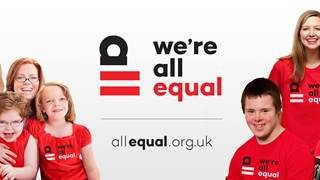Campaign launches to tackle abortion on the grounds of disability
- |

A new campaign has been launched to defend the lives of unborn children at risk of abortion because they have a disability.
The 'We're All Equal' campaign seeks to raise awareness and build support for Lord Shinkwin's Abortion (Disability Equality) Bill, which was introduced to the House of Lords on 25 May.
The Bill proposes that section (1)(1)(d) from the 1967 Abortion Act which allows abortion on the grounds of disability up to birth, should be repealed.
Currently, an abortion can take place up to birth if tests indicate that the child may be disabled when born. There is a legal limit of 24 weeks for abortions on other grounds.
Legal and lethal discrimination
Introducing his bill, Lord Shinkwin, who is himself disabled, told the House of Lord’s: "Discrimination on the grounds of disability after birth is outlawed. Yet today legal and lethal discrimination on the grounds of disability is allowed up to birth by law."
"…Where is the consistency, the justice or the equality in that?
"If anyone thinks such obvious discrimination is acceptable, I respectfully invite them to imagine the outcry if the same were applied to skin colour or sexual orientation. Such discrimination would rightly be regarded as outrageous."
The Second Reading of Lord Shinkwin’s Abortion (Disability Equality) Bill will take place on 21 October.
In need of reform
In 2013, a parliamentary inquiry investigating abortion on the grounds of disability heard that most people believe current abortion laws are outdated, discriminatory and in need of reform.
Chaired by Fiona Bruce, the inquiry discovered a number of parents who felt as if they were being "pushed towards an abortion without due consideration of the other options and that those parents who do decide to keep their child face discrimination."
The inquiry recommended that Parliament reviews the question of allowing abortion on the grounds of disability and should consider repealing the section of the Abortion Act which allows for it.
Down's syndrome concerns
Meanwhile, there are growing concerns over a new pre-natal screening test which will see an increased number of abortions for those diagnosed with conditions such as Down's syndrome.
A National Screening Committee pilot study has predicted that the new test will result in 25 fewer miscarriages per year, compared to the current pre-natal screening method, but as a result 92 more babies per year will be aborted.
Tomorrow, the BBC will air a documentary titled: 'A world without Down’s syndrome?'.
The documentary will follow Bridget Jones and Miranda star Sally Philips, whose son Olly has Down’s syndrome, as she explores whether children with Down’s syndrome could be completely eradicated, a prospect she finds "chilling”.
The Don't Screen Us Out campaign, led by international advocacy group Saving Down Syndrome, warns that the new test will "enable a kind of informal eugenics in which certain kinds of disabled people are effectively ‘screened out’ of the population before they are even born."
Unthinkable
In August, official figures revealed that the abortion of babies with a minor facial deformity has nearly tripled in the past five years.
Statistics released by the Department of Health exposed a sharp rise in the number of abortions that are carried out due to a cleft palate or lip – a condition which causes a small or wide gap in the roof of the mouth, upper lip or both.
Lord Alton, an independent crossbench peer, said that: "Aborting a baby with a cleft palate should be unconscionable. For the law to allow this up to birth should be unthinkable."
Related Links:
Lord Shinkwin explains why he introduced his Private Member’s Bill (We're All Equal)
A World Without Down's Syndrome? (BBC Two)
Parliamentary commission reveals shock figures for disability abortions
Rally held to protest new pre-natal screening
Mother writes to doctor who advised she abort her Down's baby
